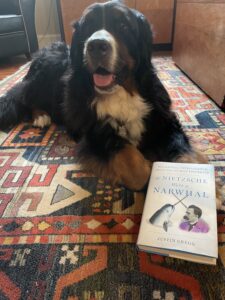 Want to be a more humble human? Check out this new dark yet highly entertaining, educational, and thought-provoking book, If Nietzsche Were a Narwhal: What Animal Intelligence Reveals About Human Stupidity by Justin Gregg.
Want to be a more humble human? Check out this new dark yet highly entertaining, educational, and thought-provoking book, If Nietzsche Were a Narwhal: What Animal Intelligence Reveals About Human Stupidity by Justin Gregg.
We humans are the most intelligent beings on Earth, but our complex thinking is by no means the superior way to do things. Our human exceptionalism is actually a blessing and a curse, as Gregg, a science writer, lecturer and teacher on animal behavior and cognition points out.
On the plus side, we use language, including the ability to question and ask “Why?” We’re also emotional and rational beings with consciousness and morals. We understand time and death.
Thanks to our brainpower, we’ve invented incredible things and we continue to achieve. Electricity. The cotton gin. Air conditioning. The Metaverse. We can cure diseases. We explore the land, the seas and space. We write songs, operas, and jingles. We paint portraits, landscapes, abstracts and create other great works of work. We invented cars. Built great cities. We write literature. Make movies and TV shows. And on and on.
But our braininess has come at a price to us humans, other living things that share the air we breathe and the planet we inhabit, and the planet itself. For example, we deceive ourselves and others, including mispresenting the truth. We discriminate. We kill other humans in mass shootings. We fight long wars. The consequences of these actions include existential angst, violence, and an upcoming climate catastrophe.
One of our biggest shortfalls, according to Gregg, is what he’s named “prognostic myopia.” This is our human capacity to think about and alter the future, which should be helpful, but it’s coupled with “an inability to actually care all that much about what happens in the future.”
On the one hand, our unique cognitive skills give us the ability to make complex decisions about long-term consequences. But on the other hand, because our brain evolved primarily to deal with immediate—not future—outcomes, we rarely experience or even understand the consequences of long-term decisions we make.
For example, back in the late 1960’s, scientists as well as oil industry executives started to understand that carbon emissions from the burning of fossil fuels would result in a “green-house effect” with significant temperature increases that would adversely affect the earth. However, it’s taken more than 50 years for us to start to take meaningful action. And greenhouse gas emissions are still rising.
Gregg’s assessment is that the “planet doesn’t love humans as much as humans love our intellect.” In fact he maintains that “Our many intellectual accomplishments are currently on track to produce our own extinction, which is exactly how evolution gets rid of adaptations that suck.”
While reading this dire very long-range forecast, I immediately went into “prognostic myopia” mode. Gregg does make a convincing case that we humans can be our own worst enemy. And new research by Yale neuroscientists also substantiates this. In their analysis of cell types in the prefrontal cortex of four primate species, they identified species-specific — particularly human-specific — features. Namely, they found that what makes us human may also make us susceptible to neuropsychiatric diseases. The unique human brain cells they discovered are linked to autism, schizophrenia, and epilepsy.
Are there any positive developments in this book? Yes! We need to show more respect to the intelligence of other species. Animal brains don’t compete with ours, yet animals can be very successful without our brainpower. Thanks to their consciousness and power of associative learning, which involves encoding the relationships between two events, such as a stimulus and a response or between two stimuli, animals can learn to take care of themselves or others in remarkable ways. For examples, chimpanzees eat certain plants for medicinal purposes. Trained pigeons can spot cancerous breast tissue more accurately than radiologists. Capuchin monkeys are concerned about sharing food fairly.
This book is a delightful wake-up call about how certain animals’ smarts can outfox other animals and us humans too. Gregg is a wonderful storyteller who brings together cognitive science, philosophy, and behavioral studies. He also asks provocative questions, puts forth controversial ideas, and sprinkles the book with laugh-out loud humorous descriptions, expressions, and anecdotes.
By the book’s end, I was admiring Gregg’s masterpiece book, feeling incredibly humble and wondering how we humans can be more like the animals we live with on earth, including @Marcelthetherapydog pictured above. This handsome boy shows me daily why I need to respect and appreciate his intelligence and everything else about him.

0 Comments